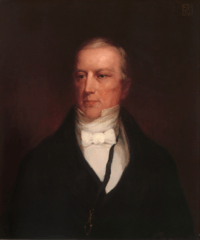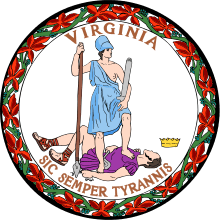Andrew Stevenson
| Andrew Stevenson | |
|---|---|
 | |
| United States Minister to the United Kingdom | |
|
In office July 13, 1836 – October 21, 1841 | |
| Preceded by | Aaron Vail (chargé d'affaires) |
| Succeeded by | Edward Everett |
| 11th Speaker of the United States House of Representatives | |
|
In office December 3, 1827 – June 2, 1834 | |
| President |
John Quincy Adams Andrew Jackson |
| Preceded by | John W. Taylor |
| Succeeded by | John Bell |
| Member of the U.S. House of Representatives from Virginia's 23rd district | |
|
In office March 4, 1821 – March 3, 1823 | |
| Preceded by | John Tyler |
| Succeeded by | None; district eliminated |
| Member of the U.S. House of Representatives from Virginia's 16th district | |
|
In office March 4, 1823 – March 3, 1825 | |
| Preceded by | John Randolph |
| Succeeded by | William Armstrong |
| Member of the U.S. House of Representatives from Virginia's 9th district | |
|
In office March 4, 1825 – March 3, 1833 | |
| Preceded by | James Stephenson |
| Succeeded by | William P. Taylor |
| Member of the U.S. House of Representatives from Virginia's 11th district | |
|
In office March 4, 1833 – June 2, 1834 | |
| Preceded by | John M. Patton |
| Succeeded by | John Robertson |
| Personal details | |
| Born |
January 21, 1784 Culpeper County, Virginia |
| Died |
January 25, 1857 (aged 73) Albemarle County, Virginia |
| Political party | Democratic |
| Alma mater | The College of William & Mary |
| Profession | Law |
Andrew Stevenson (January 21, 1784 – January 25, 1857) was a Democratic politician in the United States. He served in the United States House of Representatives, as Speaker of the House, and as Minister to the United Kingdom..
Early life
Andrew Stevenson was born in Culpeper County, Virginia on January 21, 1784. He was educated at the College of William and Mary, studied law, and attained admission to the bar in 1809. Stevenson practiced in Richmond.
Start of career
Stevenson was a member of the Virginia House of Delegates from 1809 to 1816 and 1818 to 1821. He served as Speaker of the House of Delegates from 1812 to 1815. In 1814 and 1816 he was an unsuccessful candidate for Congress.
Congressional career
In 1820 Stevenson won election to the United States House of Representatives, and he served until 1834. From 1827 to 1834 he was the Speaker of the House (20th through 23rd Congresses).
Stevenson began his Congressional career as a Democratic-Republican (17th Congress). As the Democratic-Republican Party began split in the 1820s and 1830s and reorganized as the Democratic Party, he won reelection as a Crawford Republican (18th Congress), and then as a Jacksonian (19th through 23rd Congresses).
Diplomatic career
Stevenson resigned from Congress to accept appointment as Minister to the United Kingdom. In June of that year the United States Senate denied him confirmation.
He returned to Virginia and resumed the practice of law. In addition, he presided over the 1835 Democratic National Convention.
In February 1836 President Andrew Jackson renominated Stevenson for Minister to Great Britain. He was confirmed 26 votes to 19 and served from 1836 to 1841.
His term as Minister to the United Kingdom was marked by controversy: the abolitionist cause was growing in strength, and some sections of public opinion resented the choice of Stevenson, who was a slaveowner, for this role.[1] The Irish statesman Daniel O'Connell was reported to have denounced Stevenson in public as a slave breeder, generally thought to be a more serious matter than simply being a slaveowner.[2] Stevenson, outraged, challenged O'Connell to a duel, but O'Connell, who had a lifelong aversion to dueling, refused, and suggested that he had been misquoted. The controversy became public and the repeated references to slave breeding caused Stevenson a good deal of embarrassment: there was a widespread view that if O'Connell's charges were false Stevenson would have done better to simply ignore them rather than engaging in a public squabble.[3]
Later life

Stevenson presided over the 1848 Democratic National Convention. In 1845 he was elected to the board of visitors of the University of Virginia. From 1856 to 1857 he served as the university's rector.
Death and burial
He died at his Blenheim estate on January 21, 1857. He was buried at Enniscorthy Cemetery in Keene, Virginia.
Home
Stevenson purchased the Blenheim property in Albemarle County in 1846.[4] It was added to the National Register of Historic Places in 1976.[5]
Family
Stevenson married three times. In 1809 he married Page White, who died in 1812.
In 1816 he married his second wife, Sarah (Sally) Coles, who was a cousin of Dolley Madison and a sister of Edward Coles, who served as Governor of Illinois. She died in 1848.
In 1849 he married Mary Schaff.
Steveson's son with his first wife, John White Stevenson, was a Congressman and U.S. Senator, and also served as Governor of Kentucky.
References
- ↑ Geoghegan, Patrick M. Liberator- the Life and Death of Daniel O'Connell Gill and Macmillan 2010 Dublin p.202
- ↑ Geoghegan pp.202-4
- ↑ Geoghegan p.204
- ↑ Virginia Historic Landmarks Commission Staff (December 1975). "National Register of Historic Places Inventory/Nomination: Blenheim" (PDF). and Accompanying photo
- ↑ Staff (2010-07-09). "National Register Information System". National Register of Historic Places. National Park Service.
External links
- Andrew Stevenson at the Biographical Directory of the United States Congress
- Andrew Stevenson at Find a Grave
| United States House of Representatives | ||
|---|---|---|
| Preceded by John Tyler |
Member of the U.S. House of Representatives from Virginia's 23rd congressional district March 4, 1821 – March 3, 1823 (obsolete district) |
Succeeded by (none) |
| Preceded by William L. Ball |
Member of the U.S. House of Representatives from Virginia's 9th congressional district March 4, 1823 – March 3, 1833 |
Succeeded by William P. Taylor |
| Preceded by John M. Patton |
Member of the U.S. House of Representatives from Virginia's 11th congressional district March 4, 1833 – June 2, 1834 |
Succeeded by John Robertson |
| Political offices | ||
| Preceded by John W. Taylor |
Speaker of the U.S. House of Representatives December 3, 1827 – March 3, 1829; December 7, 1829 – March 3, 1831; December 5, 1831 – March 3, 1833 December 2, 1833 – June 2, 1834 |
Succeeded by John Bell |
| Diplomatic posts | ||
| Preceded by Aaron Vail (Chargé d'Affaires) |
U.S. Minister to Britain 1836–1841 |
Succeeded by Edward Everett |
| ||||||||||||||
| ||||||||
|

